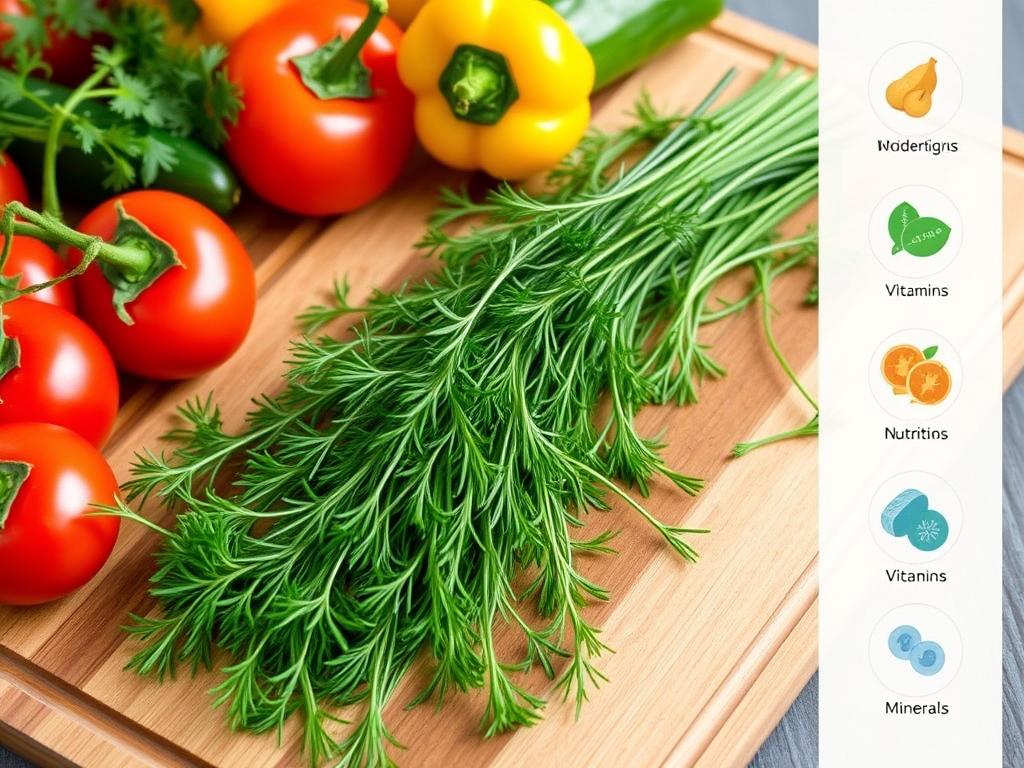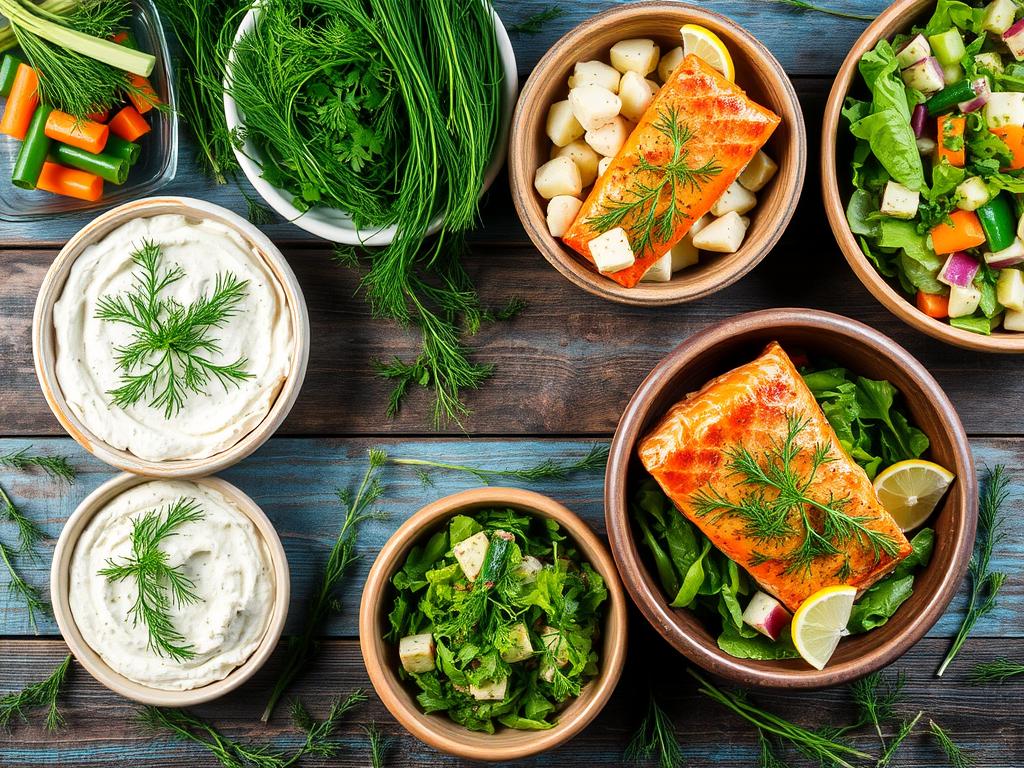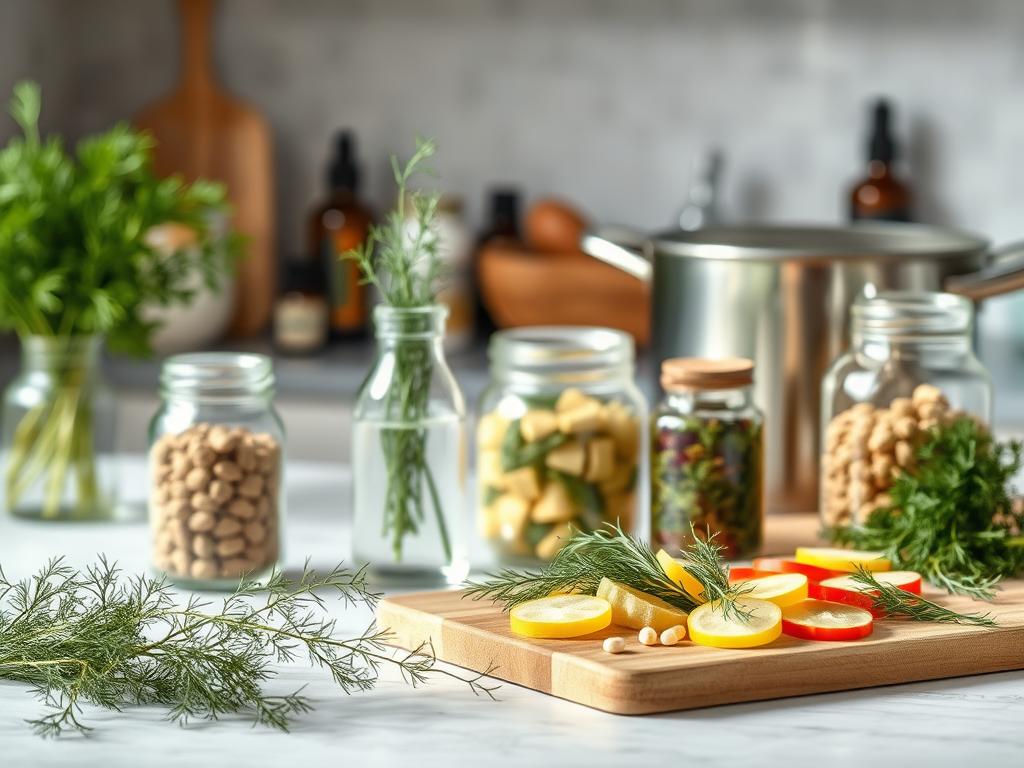Imagine standing in a sunlit kitchen, the scent of fresh herbs swirling around you like a long-lost memory. Dill, with its delicate ferns and vibrant aroma, carries a richness that goes beyond mere flavor. For generations, this versatile herb has graced our tables, transforming ordinary dishes into extraordinary experiences. Born in the Mediterranean and embraced worldwide, dill is more than just a culinary delight; it’s a reminder of the nourishing power that nature offers us. As you explore the various dill uses and discover its hidden dill health benefits, you might find that this humble herb adds not just taste but wellness to your life.
Key Takeaways
- Dill has historical roots in Mediterranean cuisine.
- Rich in essential vitamins and minerals, dill supports overall health.
- Dill can help improve digestion and reduce bloating.
- This flavorful herb contains antioxidants that protect against cellular damage.
- Dill can be easily integrated into a variety of dishes for added flavor.
Introduction to Dill and Its Culinary Role
Dill, a versatile and aromatic herb, adds a unique flavor to various dishes. Known for its feathery foliage and delicate flowers, this Dill herb originates from the Mediterranean region and Southeast Europe. A popular choice in kitchens worldwide, dill contributes both taste and health benefits to various recipes.
What is Dill?
Dill is a biennial herb that typically grows up to three feet tall. The plant showcases vibrant green leaves, often referred to as dill weed. The sweet and tangy flavor profile of dill makes it a cherished ingredient in many culinary traditions. Enhancing both visual appeal and flavor, dill is a wonderful addition to numerous dishes.
Culinary Uses of Dill
Dill cooking brings depth to an array of recipes, with its primary uses including:
- Pickling: Dill seeds play a crucial part in flavoring pickles and other preserved vegetables.
- Fish Dishes: Dill complements seafood, making it a popular herb for marinades and sauces.
- Salads: Fresh dill adds a refreshing touch to salads, enhancing taste and nutrition.
- Dressings: Dill herb elevates salad dressings and dips, providing a punch of flavor.
This herb is not only a staple in various cuisines but also revered for its health benefits. Incorporating Dill into your meals offers an enjoyable way to boost flavor while reaping its many nutritional advantages.
Nutritional Profile of Dill
Dill is a powerhouse of nutrients, enhancing both flavor and health in various dishes. This herb is incredibly low in calories, making it a guilt-free addition to meals. A 1-cup serving of fresh dill, weighing approximately 9 grams, delivers about 4 calories. In this small serving, dill offers an array of key vitamins and minerals that contribute to overall wellness.
Key Vitamins and Minerals
Fresh dill provides close to 10% of the Daily Value for vitamin C, along with small quantities of manganese, folate, and iron. This nutrient-rich profile positions dill as a beneficial component in a balanced diet. When utilizing dried dill, which contains about 8 calories per tablespoon, the nutrients remain concentrated, and it can still improve dill nutrition. Remember that when substituting dried for fresh, use one-third of the amount as dried dill has a more potent flavor.
Dietary Fiber Content
Dill not only contributes vitamins but also contains dietary fiber vital for digestive health. Though a single cup of fresh dill has about 0g of fiber, incorporating this herb with other fiber-rich foods can enhance digestive health and overall gut function. Its antimicrobial properties can complement diets focused on maintaining gut flora balance. Explore resources like natural dietary solutions to further support wellness.

Surprising Health Benefits of Dill
Dill, a flavorful herb, offers numerous health advantages that go beyond enhancing the taste of dishes. With its unique composition, this herb showcases remarkable qualities that contribute to overall well-being. Below, we delve into some of the most noteworthy Dill health benefits including its antioxidant properties, antimicrobial effects, and support for digestive health.
Antioxidant Properties
Dill contains powerful antioxidants such as flavonoids, tannins, and terpenoids. These compounds help protect the body’s cells from oxidative stress caused by free radicals. Research from Penn State University indicates that the inclusion of herbs like dill in daily meals may lead to a significant reduction in blood pressure. This offers promising implications for heart health, pointing to potential benefits for individuals dealing with hypertension.
Antimicrobial Effects
Dill exhibits notable antimicrobial properties, which can be particularly beneficial in food preservation. Studies show that dill can combat harmful bacteria such as Staphylococcus aureus. The inclusion of herbs with antimicrobial effects fortifies the immune system and can enhance food safety, showcasing another of the impressive Dill benefits.
Supports Digestive Health
Traditionally used in herbal medicine, dill is recognized for its ability to aid digestion. It helps alleviate common digestive issues such as gas and bloating. Dill not only stimulates appetite, making it a great addition for infants, but it also supports overall digestive health by promoting regularity and comfort after meals. Including dill in your diet can be a delightful way to support your digestive system.
How to Incorporate Dill into Your Diet
Integrating dill into your meals can elevate flavors and enhance health benefits. Both fresh and dried dill offer unique qualities for various culinary applications.
Fresh Dill vs. Dried Dill
Fresh dill boasts a vibrant flavor, making it perfect for garnishing dishes like soups, salads, and roasted vegetables. This herb enhances flavors while providing a nutritional boost. In contrast, dried dill serves as an excellent dill seasoning alternative, allowing easy incorporation into marinades, dips, and sauces. It typically provides a more concentrated taste and is ideal for dill cooking where intense flavor is desired.
Delicious Dill Recipes
Explore a variety of enticing dill recipes that showcase this herb’s versatility. Consider trying:
- Dill-infused yogurt sauce, perfect for grilled meats and vegetables.
- A hearty potato salad that combines boiled potatoes, fresh dill, and a tangy dressing.
- Homemade pickles featuring dill seeds for an added crunch.
- Refreshing dill tea that serves as a soothing beverage infused with health benefits.

Growing Dill in Your Garden
Growing dill offers a rewarding experience for both novice and experienced gardeners. This herb thrives under certain conditions and is known for its ease of care. Understanding the ideal environment and how to properly harvest will ensure a successful growth cycle for your dill plant.
Ideal Growing Conditions
The dill plant flourishes in well-drained soil with a pH level of 5.5 to 7.0. It prefers full sun, requiring at least six hours of direct sunlight each day. The optimal soil temperature for germination ranges from 60 to 70º Fahrenheit (15 to 21º Celsius). Dill can be grown in containers or directly in the ground, making it versatile for various gardening setups.
Although this herb is drought-tolerant, regular watering is necessary, particularly in dry spells. It’s important not to overwater, as dill does not require heavy fertilization or amendments to the soil. Many gardeners appreciate how low-maintenance growing dill can be while attracting beneficial insects, such as ladybugs and hoverflies, that naturally manage pest populations.
Tips for Harvesting Dill
| Variety | Days to Maturity | Flavor Profile |
|---|---|---|
| Hera Dill | 40-50 days | Sweet and mild |
| Thalia Dill | 40-50 days | Mild |
| Dukat Dill | 50-60 days | Sweet |
| Teddy Dill | Faster growth | Intense flavor |
| Fernleaf Dill | 60-70 days | Long-lasting aroma |
| Bouquet Dill | 60-70 days | Ideal for pickling |
Potential Side Effects and Considerations
While dill is celebrated for its delightful flavor and numerous health benefits, it’s essential to discuss some potential side effects and considerations before adding it to your diet. Understanding these aspects will enhance dill uses while ensuring safe consumption practices.
Allergies and Sensitivities
Some individuals may experience allergic reactions to dill, particularly those sensitive to plants in the carrot family. Symptoms can include skin irritation or digestive discomfort. Pregnant and breastfeeding women should take extra care with dill health considerations; although dill is usually safe in small amounts, consulting a healthcare provider is wise. Overconsumption of dill during pregnancy may lead to skin irritations or even increase the risk of miscarriage.
Interactions with Medications
Dill has shown potential interactions with certain medications, especially those that affect blood sugar levels. Research indicates that dill consumption can lower blood glucose levels, which could pose risks for individuals on diabetic medications. Caution is advised, and it is vital to consult a healthcare provider before incorporating large amounts of dill into your diet, particularly if you are on medication or managing a chronic health condition.

| Condition | Dill’s Effect |
|---|---|
| Allergic reactions | Possible skin irritation and digestive issues |
| Pregnancy | Safe in moderation; consult healthcare provider |
| Diabetes | May lower blood sugar; monitor levels |
| Skin sensitivity | Possible irritation if applied directly |
Understanding these side effects will allow you to enjoy the many benefits of dill safely. For further insights on dietary practices involving dill, be sure to explore more on dill health considerations and how to incorporate it into your wellness routine.
Storage Tips for Fresh and Dried Dill
Proper dill storage ensures you enjoy the vibrant flavors of this herb for longer. Here are some best practices to keep your fresh dill and dried dill in optimal condition.
Best Practices for Fresh Dill
To extend the life of fresh dill, consider these effective methods:
- Spritz the leaves with water, wrap them in a damp paper towel, and place them in a zip-top bag in the refrigerator. This method allows fresh dill to last up to one week.
- Store fresh dill upright in a glass of water in the refrigerator, which can keep it fresh for up to a week and is especially handy for recipes like salads.
- Chop fresh dill and store it in an airtight container for up to 14 days. This is perfect for quick access to this aromatic herb.
- Wrap fresh dill in a paper towel and store it in a resealable plastic bag to extend its shelf life to up to 16 days.
- For long-term storage, freezing fresh dill in an airtight container can preserve its flavor for up to six months, although the texture may change after thawing.
How to Store Dried Dill
Dried dill requires specific conditions to maintain its potent flavor. Follow these storage tips:
- Keep dried dill in a cool, dry place, away from direct sunlight and heat sources. A sealed container works best.
- Use dried dill within six months to a year to ensure the best flavor profile. Over time, the potency of dried dill diminishes.
Effective dill storage methods not only preserve its delightful taste but also enhance your culinary creations. For inspiration on using fresh and dried dill in delicious recipes, check out this link for homemade snack ideas. Enjoy the unique flavors dill brings with proper care and preparation!
Conclusion: Embracing Dill for Flavor and Wellness
Dill, often overlooked in favor of other culinary herbs, offers a remarkable array of health benefits that enhance both flavor and nutrition. This vibrant herb not only elevates the taste of your dishes but also provides significant health advantages, such as its antioxidant properties and digestive support. By incorporating dill regularly into your meals, you are not just seasoning your food; you are making a conscious choice to promote your overall well-being.
Final Thoughts on Dill’s Benefits
Research shows that the use of herbs like dill is rooted in ancient practices, where they were celebrated for their medicinal properties. The versatility of dill makes it a prime candidate for various recipes, whether you are tossing it into salads, incorporating it into marinades, or using it as a garnish on seafood. For those looking to explore these advantages further, you can find more details about the extensive benefits of dill in traditional medicine here.
Encouragement to Use Dill Regularly
Don’t hesitate to experiment with dill recipes, as its unique flavor profile can transform everyday meals into culinary delights. Making a habit of incorporating herbs like dill into your cooking can be a delicious way to support your health, adding not only flavor but also beneficial nutrients to your diet. Embrace dill as an essential part of your kitchen pantry and enjoy the myriad ways it contributes to your wellness journey.











